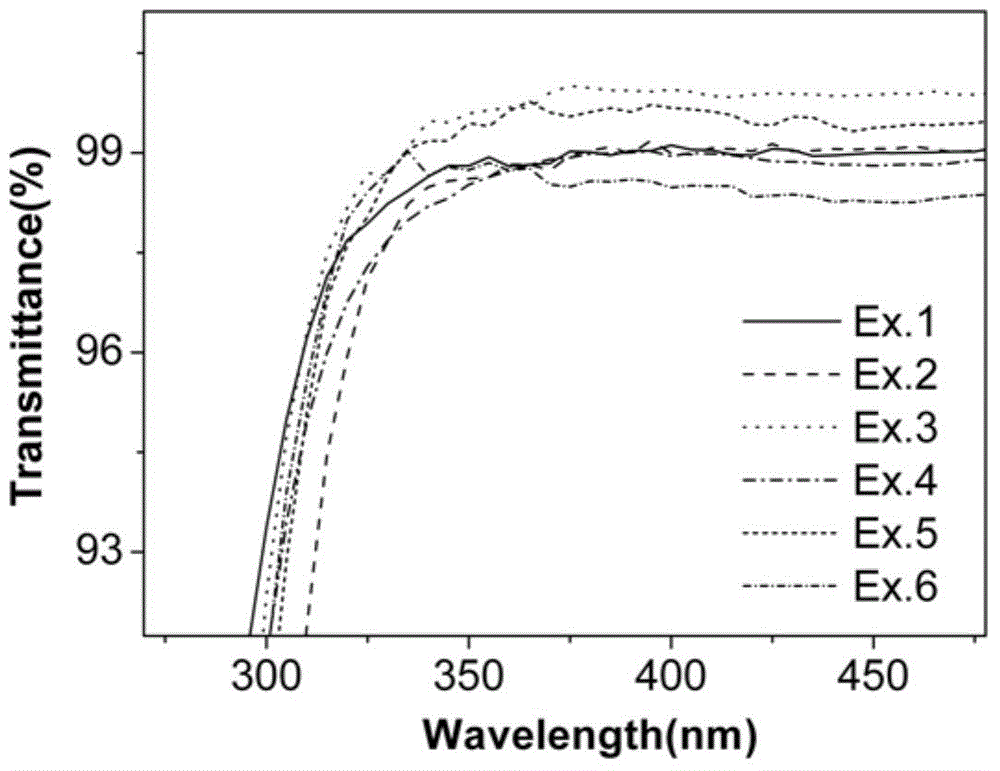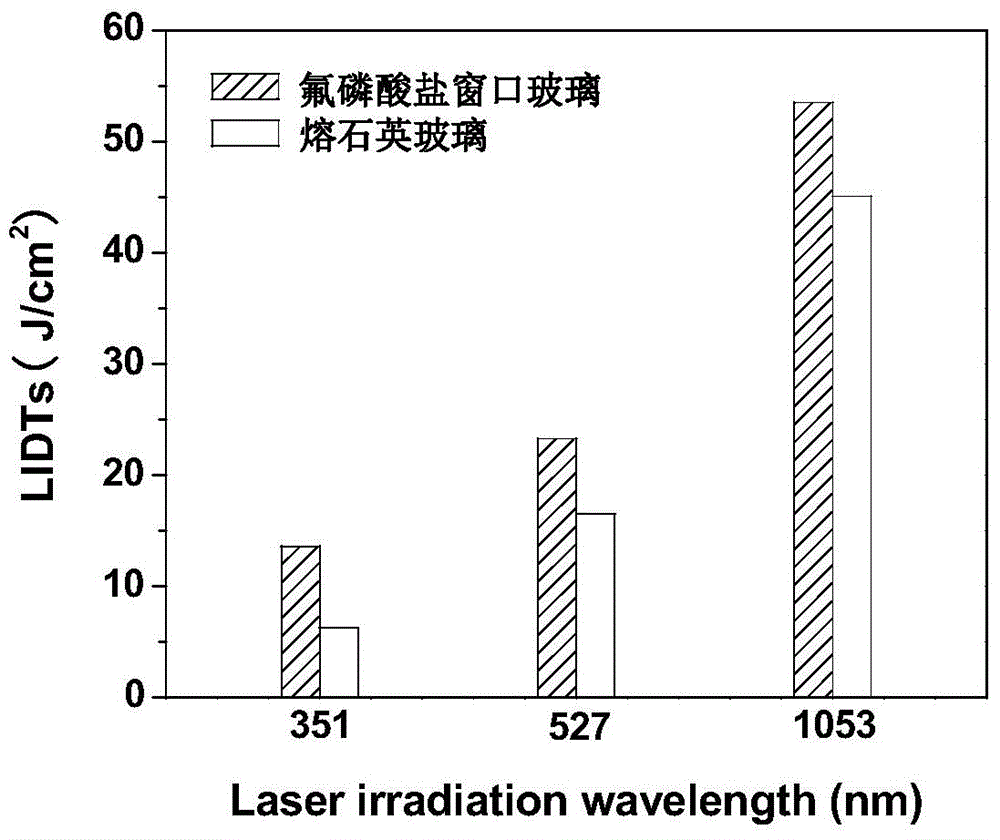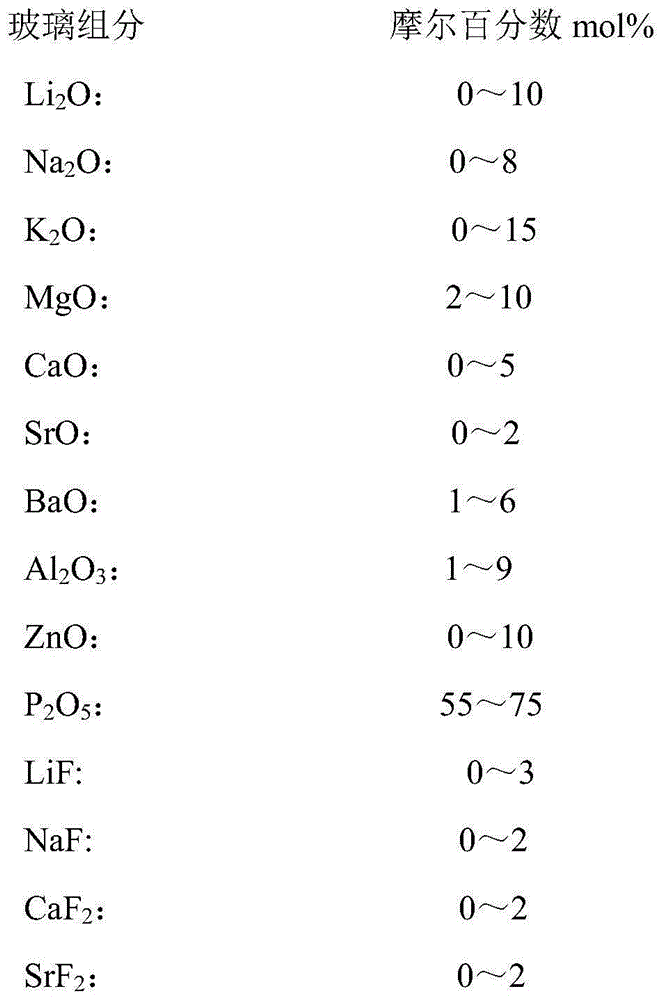Ultraviolet-transmittance and high-damage-threshold fluoride phosphate laser glass and preparation method thereof
A high damage threshold, fluorophosphate technology, applied in glass manufacturing equipment, glass furnace equipment, glass production, etc., can solve the problems of easy crystallization of fluoride glass, low triple frequency damage threshold, and difficulty in large-scale production. Achieve the effect of being suitable for large-scale mass production, high resistance to laser damage threshold, and improving load capacity
- Summary
- Abstract
- Description
- Claims
- Application Information
AI Technical Summary
Problems solved by technology
Method used
Image
Examples
Embodiment 1
[0039] According to the above recipe 1 # Calculate the weight percent of the glass from the molar composition in the glass, then weigh a total of 25Kg of raw materials, and mix them uniformly in the mixing box. Add the prepared powder into the 11-liter platinum crucible in turn, and heat and melt it through a silicon carbide electric furnace. The melting temperature is controlled at about 1280 ° C, and the melting time is 6 hours. The liquid is stirred. After the glass liquid has been clarified to remove air bubbles and fully stirred evenly, the high-temperature glass liquid is injected into the copper mold preheated to 300°C through the leak nozzle at the bottom of the crucible to form a glass blank, and the formed glass sample is quickly demolded and placed in the Has been heated to the annealing temperature (set at the transition temperature T of the glass g In the muffle furnace nearby), after 12 hours of heat preservation, the temperature is lowered to 100°C at a coolin...
Embodiment 2
[0044] According to the above recipe 2 # Calculate the weight percent of the glass from the molar composition in the glass, then weigh a total of 25Kg of raw materials, and mix them uniformly in the mixing box. Add the prepared powder into the 11-liter platinum crucible in turn, and heat and melt it through a silicon carbide electric furnace. The melting temperature is controlled at about 1280 ° C, and the melting time is 6 hours. The liquid is stirred. After the glass liquid has been clarified to remove air bubbles and fully stirred evenly, the high-temperature glass liquid is injected into the copper mold preheated to 300°C through the leak nozzle at the bottom of the crucible to form a glass blank, and the formed glass sample is quickly demolded and placed in the Has been heated to the annealing temperature (set at the transition temperature T of the glass g In the muffle furnace nearby), after 12 hours of heat preservation, the temperature is lowered to 100°C at a coolin...
Embodiment 3
[0048] According to the above recipe 3 # Calculate the weight percent of the glass from the molar composition in the glass, then weigh a total of 25Kg of raw materials, and mix them uniformly in the mixing box. Add the prepared powder into the 11-liter platinum crucible in turn, and heat and melt it through a silicon carbide electric furnace. The melting temperature is controlled at about 1280 ° C, and the melting time is 6 hours. The liquid is stirred. After the glass liquid has been clarified to remove air bubbles and fully stirred evenly, the high-temperature glass liquid is injected into the copper mold preheated to 300°C through the leak nozzle at the bottom of the crucible to form a glass blank, and the formed glass sample is quickly demolded and placed in the Has been heated to the annealing temperature (set at the transition temperature T of the glass g In the muffle furnace nearby), after 12 hours of heat preservation, the temperature is lowered to 100°C at a coolin...
PUM
| Property | Measurement | Unit |
|---|---|---|
| particle size (mesh) | aaaaa | aaaaa |
Abstract
Description
Claims
Application Information
 Login to View More
Login to View More - R&D
- Intellectual Property
- Life Sciences
- Materials
- Tech Scout
- Unparalleled Data Quality
- Higher Quality Content
- 60% Fewer Hallucinations
Browse by: Latest US Patents, China's latest patents, Technical Efficacy Thesaurus, Application Domain, Technology Topic, Popular Technical Reports.
© 2025 PatSnap. All rights reserved.Legal|Privacy policy|Modern Slavery Act Transparency Statement|Sitemap|About US| Contact US: help@patsnap.com



